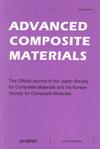Effect of hygrothermal condition on single-lab shear behavior of induction-welded CF/PEKK thermoplastic composites
IF 2.3
3区 材料科学
Q3 MATERIALS SCIENCE, COMPOSITES
引用次数: 3
Abstract
This study analyzed the effects of hygrothermal conditions on the single-lap shear strength of a carbon fiber/poly-ether-ketone-ketone (CF/PEKK) thermoplastic composite material fabricated by induction welding. Specimens were exposed to an 85 °C/85% environment using a temperature and humidity chamber to identify the effect of moisture on single-lap shear strength, while their moisture saturation was assessed through weight measurement. Single-lap shear strength tests were performed on the dried and saturated specimens at 25 °C and 100 °C to 180 °C at 20 °C intervals. At 160 °C, the strength of the CF/PEKK thermoplastic composites rapidly declined to 76% (dried specimens) and 78% (moist specimens). The fracture surfaces and failure modes were analyzed using scanning electron microscopy images, which confirmed an increase in the degraded areas and naked fibers at higher testing temperatures. In addition, it was found that exposure to a moist environment changes the failure mode from fiber bundles and fiber/matrix failure to naked fiber and matrix failure owing to the reduction in interfacial adhesion properties. The findings confirmed that hygrothermal conditions directly affect the degradation of the CF/PEKK thermoplastic composites and that a rapid reduction in the single-lap shear strength occurs above Tg.湿热条件对感应焊接CF/PEKK热塑性复合材料单室剪切性能的影响
研究了湿热条件对感应焊接制备的碳纤维/聚醚-酮-酮(CF/PEKK)热塑性复合材料单搭接剪切强度的影响。将试件置于85°C/85%的温湿度箱中,确定水分对单搭抗剪强度的影响,并通过称重评估试件的水分饱和度。在25°C和100°C ~ 180°C间隔20°C的条件下,对干燥和饱和试样进行单圈抗剪强度试验。在160℃时,CF/PEKK热塑性复合材料的强度迅速下降到76%(干燥试样)和78%(潮湿试样)。利用扫描电镜图像分析了断裂面和破坏模式,证实了在较高的测试温度下,降解区域和裸露纤维的增加。此外,由于界面粘附性能的降低,暴露在潮湿环境中会使纤维束和纤维/基体的破坏模式转变为裸纤维和基体的破坏模式。研究结果证实,湿热条件直接影响CF/PEKK热塑性复合材料的降解,并且单次剪切强度在Tg以上会迅速降低。
本文章由计算机程序翻译,如有差异,请以英文原文为准。
求助全文
约1分钟内获得全文
求助全文
来源期刊

Advanced Composite Materials
工程技术-材料科学:复合
CiteScore
5.00
自引率
20.70%
发文量
54
审稿时长
3 months
期刊介绍:
"Advanced Composite Materials (ACM), a bi-monthly publication of the Japan Society for Composite Materials and the Korean Society for Composite Materials, provides an international forum for researchers, manufacturers and designers who are working in the field of composite materials and their structures. Issues contain articles on all aspects of current scientific and technological progress in this interdisciplinary field. The topics of interest are physical, chemical, mechanical and other properties of advanced composites as well as their constituent materials; experimental and theoretical studies relating microscopic to macroscopic behavior; testing and evaluation with emphasis on environmental effects and reliability; novel techniques of fabricating various types of composites and of forming structural components utilizing these materials; design and analysis for specific applications.
Advanced Composite Materials publishes refereed original research papers, review papers, technical papers and short notes as well as some translated papers originally published in the Journal of the Japan Society for Composite Materials. Issues also contain news items such as information on new materials and their processing."
 求助内容:
求助内容: 应助结果提醒方式:
应助结果提醒方式:


